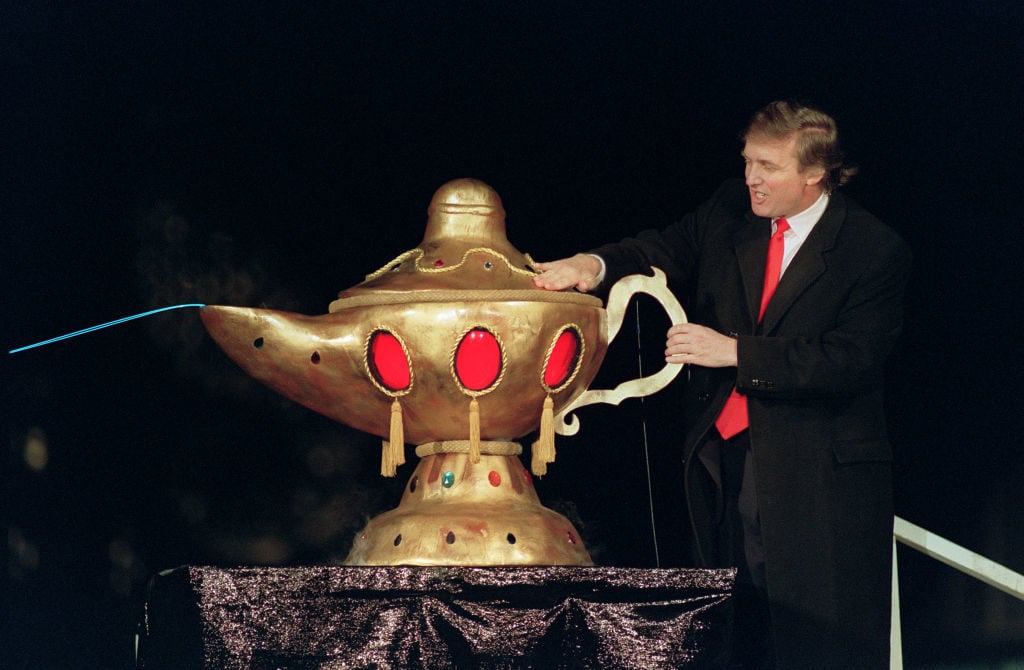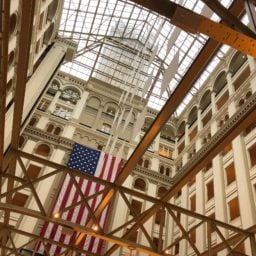Every Sunday this August, public historian Levi Fox sets up shop in front of Atlantic City’s soon-to-be-demolished Trump Plaza Hotel and Casino. There, using a simple folding table and duffle bag, he presents roughly 60 objects, from a Trump Marina teddy bear to vintage black-and-white photos of vanished Trump properties, that piece together the complex, consequential story of how Donald Trump transformed this New Jersey town for better and worse.
Arguably, the history of Atlantic City is more entwined with the story of now-President Trump than any other. The Atlantic City Trump Museum Project covers a 32-year period in local history—an era that began with the opening of the Trump Plaza in 1984 and ended with the shuttering of the Trump Taj Mahal in 2016.
That same year, with Trump dominating the news, Fox began thinking of his celebrity as a source of “heritage tourism” for the distressed boardwalk town. A temporary “Trump’s Gambling Heritage Tour” highlighted The Donald’s legacy in the city, in an adamantly non-partisan way. The media it generated led Fox to imagine something even more ambitious.
Speaking with artnet News by phone, Fox says he was interested in exploring what a museum was or could be. When he first began pitching the idea two years ago, most commenters assumed that any museum to Trump would be a celebration. But building a golden altar to Donald Trump was not Fox’s goal.
“A museum is a place for engagement of diverse perspectives,” he says. Its job, he thinks, isn’t just to display objects in a public forum. It is to properly and even-handedly contextualize those objects in a way that will allow visitors to draw their own informed conclusions—a task that Fox believes can only be best done with in-the-flesh educators like himself.

Atlantic City Trump Museum Project founder Levi Fox, wearing a Hawaiian shirt from the collection that commemorates Trump’s 50th Birthday Gala at the Trump Taj Mahal in 1996. Image courtesy of Levi Fox.
This perspective has made building and presenting the Atlantic City Trump Museum Project’s collection a hands-on process, both literally and figuratively.
Although Fox is always pursuing donations, to date he has purchased the majority of the Trump-related artifacts himself, mostly through eBay. He has prioritized items that can be touched and handled by visitors, even though this often means they’re in less pristine condition than others.
“Some of the artifacts, in my mind, are much more valuable as shareable history than they are as collectors’ items,” he says.
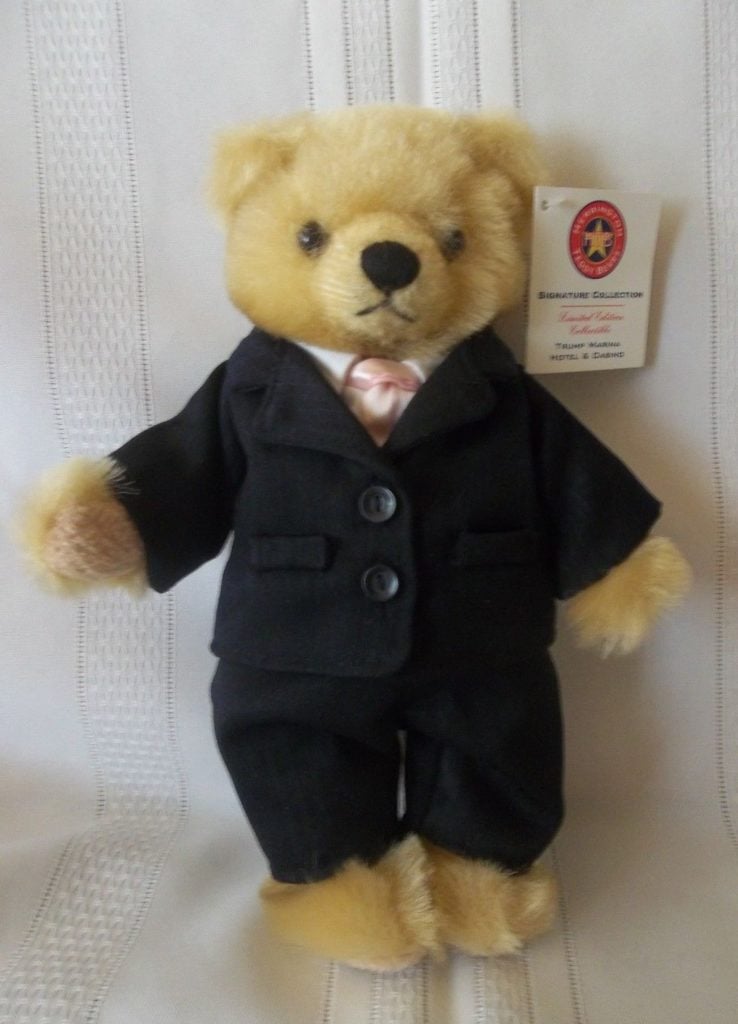
Marina Trump Teddy, made in China. Photo courtesy of Levi Fox.
With Trump in the White House, that history now radiates into our present—and future—in ways few people working outside of a New Jersey casino could ever have imagined. Thanks to their origins, the artifacts in the Trump Museum Project’s collection pose sneaky questions about Trump’s evolution (or devolution) on one of the foundational issues of his presidency: trade policy.
Fox exhibits all manner of Trump-branded items. A few were made in the US by union labor, but many came from regions or countries that Trump has threatened (or worse) as president.
The educator sees these exhibits as an intervention into the public debate, believing that the physical artifacts speak for themselves in ways that punditry can’t. “It’s much harder to argue with a tag sewn into a sweatshirt that says it was made in El Salvador or a T-shirt that says it was made in Pakistan than just me talking about those changes,” he explains.
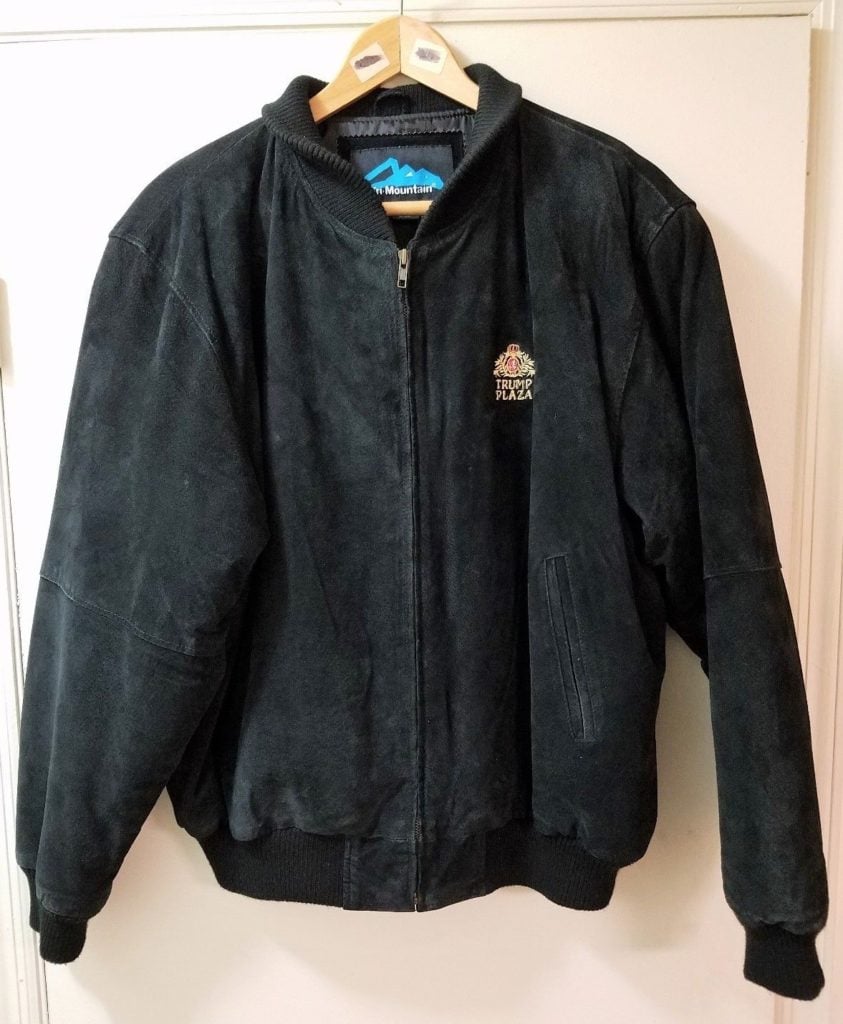
Trump Plaza Suede Jacket, made in China. Photo courtesy of Levi Fox.
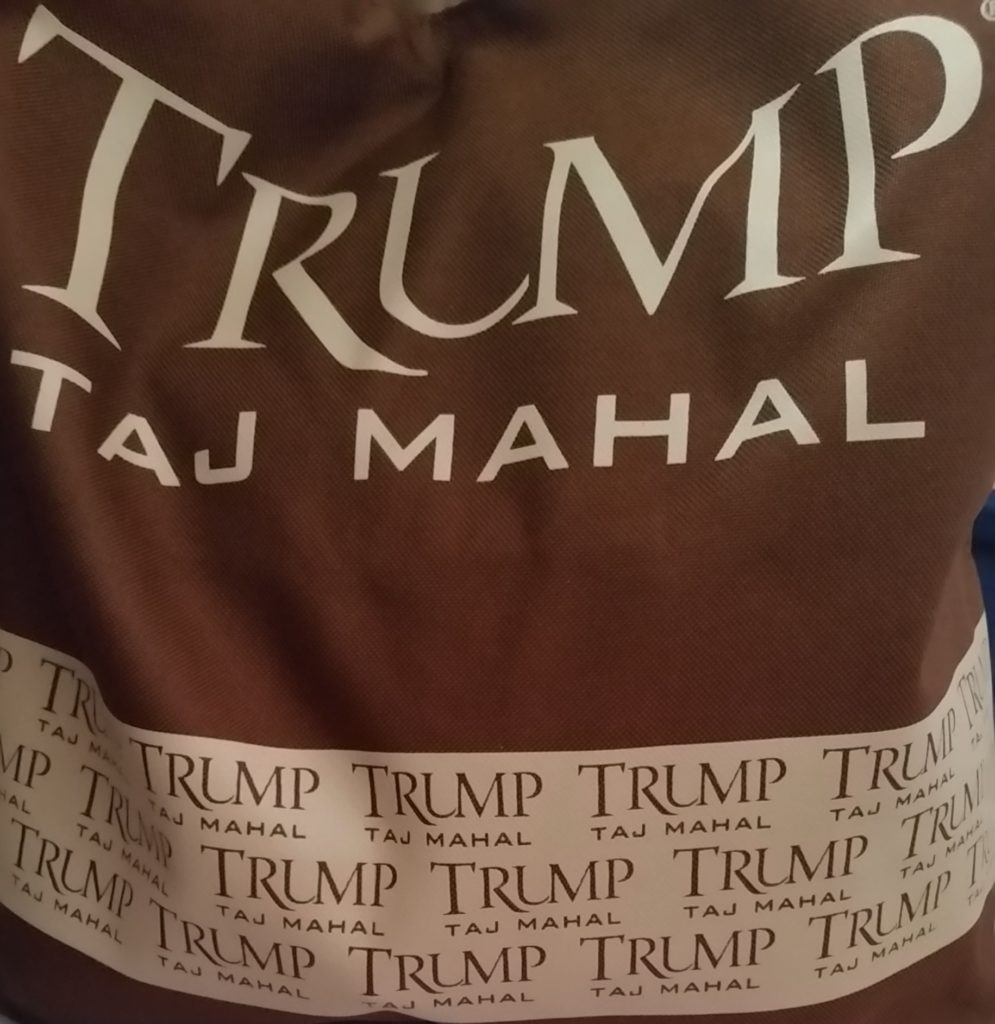
Trump Taj Mahal Bag, made in the United States by Union Labor. Photo courtesy of Levi Fox.
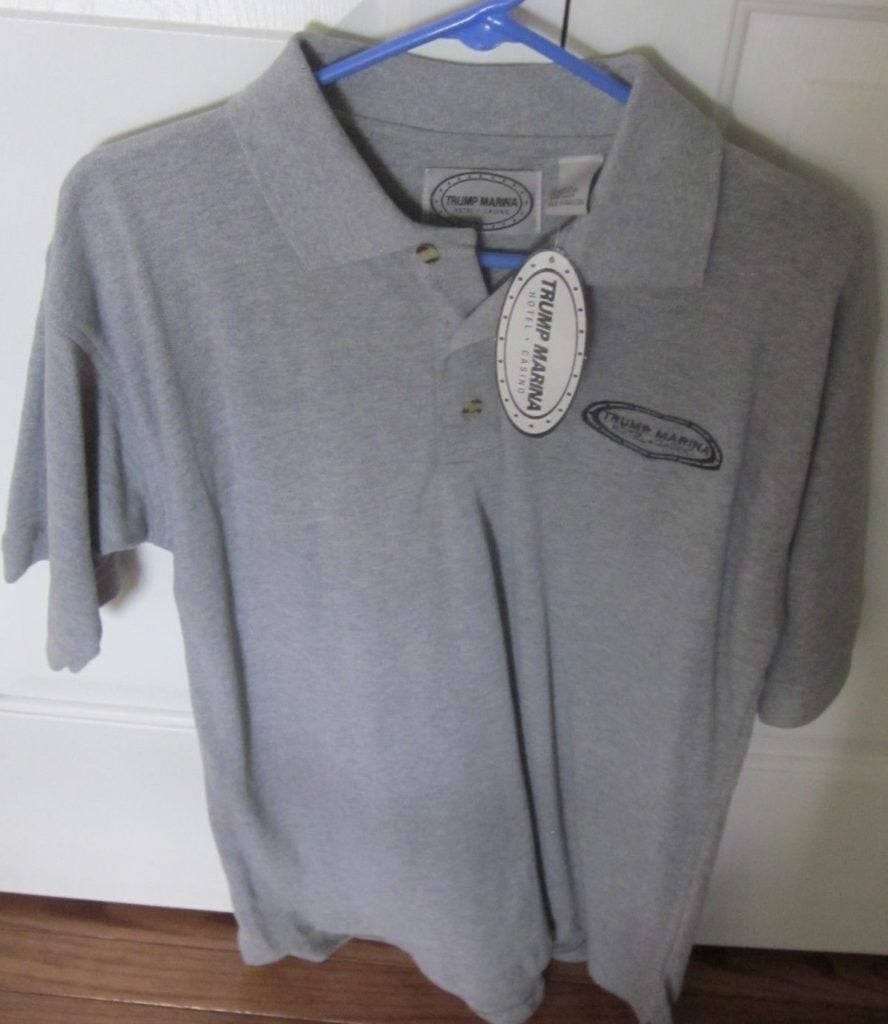
Trump Marina Polo Shirt, made in Pakistan. Photo courtesy of Levi Fox.
Trump’s personal legacy on the Boardwalk traced an extreme arc, too. “The day the Taj opened, everyone in Atlantic County loved Donald Trump,” says Fox.
But years later, his path out of New Jersey was littered with scores of unpaid contractors, hundreds of downsized former employees, multiple headline-grabbing bankruptcies, and even a widow forced to battle an eminent domain lawsuit bent on turning her home into the Trump Plaza’s limousine parking lot.
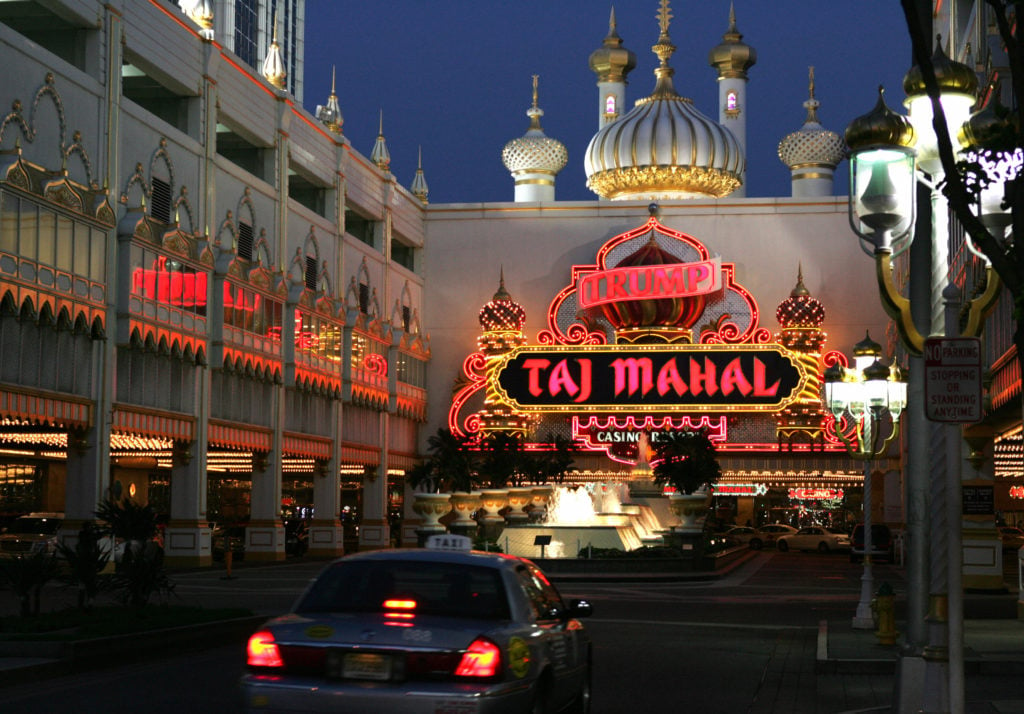
The Trump Taj Mahal Hotel and Casino in Atlantic City, New Jersey. Photo: Saul Loeb/AFP/Getty Images.
Even Fox’s current branding of the Project reflects the two-sided nature of his subject. Every Sunday, he advertises with a sign reading “The (Pop-Up) Atlantic City Trump Museum” on the face and “The (Pop-Up) Atlantic City Anti–Trump Museum” on the reverse. This, Fox says, is an acknowledgment that “history is not one-sided.”
He notes that, up to now, “most folks on the Boardwalk” seem to have preferred the anti-Trump side of the sign. In some cases, he’s been able to open a conversation with passersby booing the neutral face by flipping to the partisan one.
But the other side of the aisle has had its say, too. Fox recalls receiving multiple shouts of “MAGA” from the Boardwalk during the pop-up’s run. Last Sunday, one man doubled back on his path to “proceed to tell me that we have the best economy ever, ISIS is gone, and I should get a job, in that order.” (In addition to teaching classes at Temple University, where Fox recently earned a Ph.D. in public history, he is an adjunct professor at New Jersey’s Stockton University.)
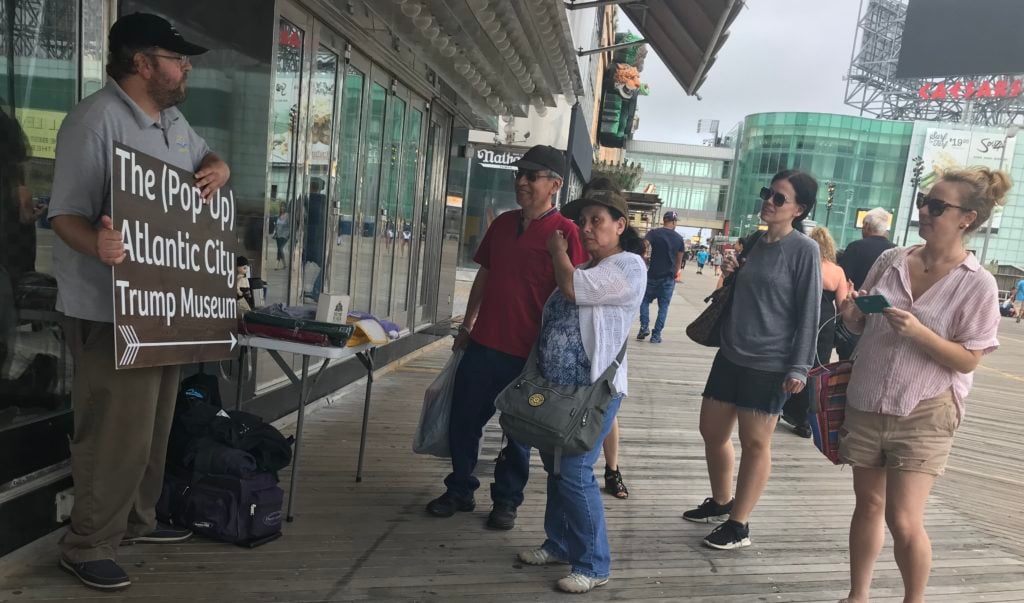
The (Pop-Up) Atlantic City Trump Museum, presented every Sunday in August 2018. Photos courtesy of Levi Fox.
This Sunday will be the last edition of Fox’s pop-up, but it is only the first phase of the Atlantic City Trump Museum Project.
Fox has already set aside the money to apply for 501(c)3 nonprofit status. If all goes to plan, the next step will be a temporary Trump Museum exhibit, followed by a permanent storefront location on the Boardwalk, maybe in the summer or fall of 2020, just in time for the next elections.
Until then, Fox will continue presenting Trump-themed historical tours of Atlantic City every Sunday at 5:30 PM, as well as building the Project’s collection.
Since Trump’s impact on Atlantic City cannot be told through memorabilia alone, Fox has also added a page on the museum’s website asking visitors to send in their Trump stories. He is particularly keen on hearing from foreign-born ex-employees at Trump properties. He notes that the region’s demographics diversified dramatically in the 1990s, “when Donald Trump was the biggest employer in town”—a reality that contrasts sharply with his protectionism and nativism as president.
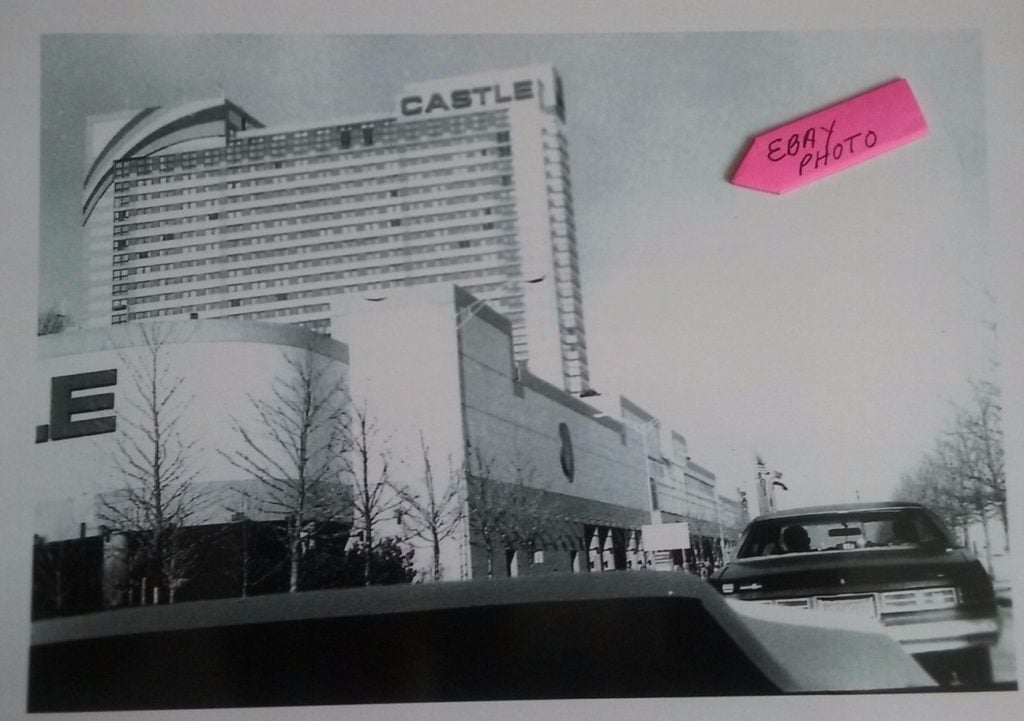
A photo of Trump Castle in Atlantic City, circa 1990, purchased by the museum on eBay and equipped with a telling personal history. Photograph courtesy of Levi Fox.
Trump’s intersections with Atlantic City residents of all backgrounds are only destined to grow in symbolism, Fox thinks. As an example, he talks about the backstory behind a photo of the Trump Castle (which later became the Trump Marina before being sold off and transformed into the Golden Nugget).
After Fox purchased the black-and-white image on eBay, the seller told him that her son, then a college student focusing in art and design, had worked in one of the Castle’s restaurants for consecutive summers in 1989 and 1990.
Grateful to Trump for the opportunity, he spent many hours painting a large oil on canvas of the Trump Princess, the mogul’s prized 281-foot yacht. Since Trump wasn’t in his office when the young man went to drop off the gift after his last day on the job, a secretary instructed him to lean it against the desk so it would be the first thing her boss saw when he returned. The young man left his name and address on the back of the piece.
“He never received a thank-you note from anyone,” the photo’s seller recounted to Fox. “Not Donald, not even written by his secretary. We were very disappointed.”
The (Pop-Up) Atlantic City Trump Museum Project will be on view this Sunday, August 26, in front of the former Trump Plaza hotel and casino, 2201 Boardwalk, Atlantic City, New Jersey.
